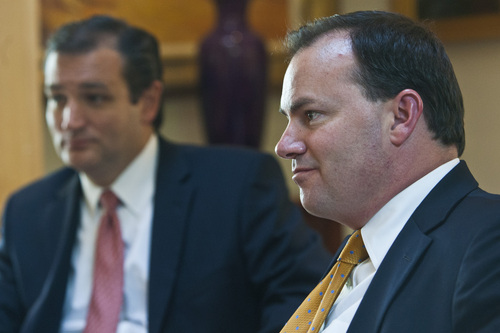This is an archived article that was published on sltrib.com in 2014, and information in the article may be outdated. It is provided only for personal research purposes and may not be reprinted.
Washington • Sens. Mike Lee and Ted Cruz say they will block any non-emergency legislation that Democrats try to push through after the mid-term elections, arguing that the lame-duck session shouldn't be used to enact sweeping measures like immigration reform.
The tea-party duo, whose fight against Obamacare led to the 16-day government shutdown last year, also argue that a temporary budget fix should extend until next year so that members of Congress who aren't seeking re-election or who are defeated don't get to vote on the spending bill.
"By any measure, deliberately planning to reconvene the Senate in a lame-duck session to address major new legislation would subvert the will of the American people, lessen accountability, and do lasting damage to the dignity and integrity of this body's proceedings," Lee and Cruz wrote to Majority Leader Harry Reid.
Lee's office stressed that the Utah Republican has voted against every stopgap budget bill since he took office in 2011. He prefers the regular budget process, not temporary measures – and isn't trying to set up a showdown over the spending bill. Lee was the architect of the GOP strategy last year to block government funding while demanding budget cuts for Obamacare, a game of brinkmanship that led to the first federal closure in 17 years.
Lee and Cruz say in their letter that if Reid calls a lame-duck session they will vote against any agreements on major issues such as immigration, taxes or spending, in a move that would force the Senate to take roll-call votes and delay, or perhaps stop, some measures from passing. Any one senator can object to a unanimous consent agreement under Senate rules.
"Presumably, a lame-duck session would be used to try to pass partisan, unpopular bills in November or December that might be indefensible before the federal election on November 4th," Lee and Cruz say, arguing that would be unfair to the American people because some members wouldn't have any accountability to Americans.
The threat extends to nominations and treaties, not just legislation, the two said.
With Congress divided and partisanship rife, another government shutdown remains a possibility. The current budget authority expires at the end of September, and the House and Senate only have a few scheduled workdays left to approve another extension.
Reid said this week that if Republicans tried to attach legislation to the temporary budget bill that blocked the president from using executive authority on immigration, it could lead to another shutdown of national parks, closure of federal buildings and furloughs of workers.
"They have every right to do whatever they want legislatively," Reid told reporters. "If they want to be the lead team of shutting down the government, that's what they're going to have to do."



